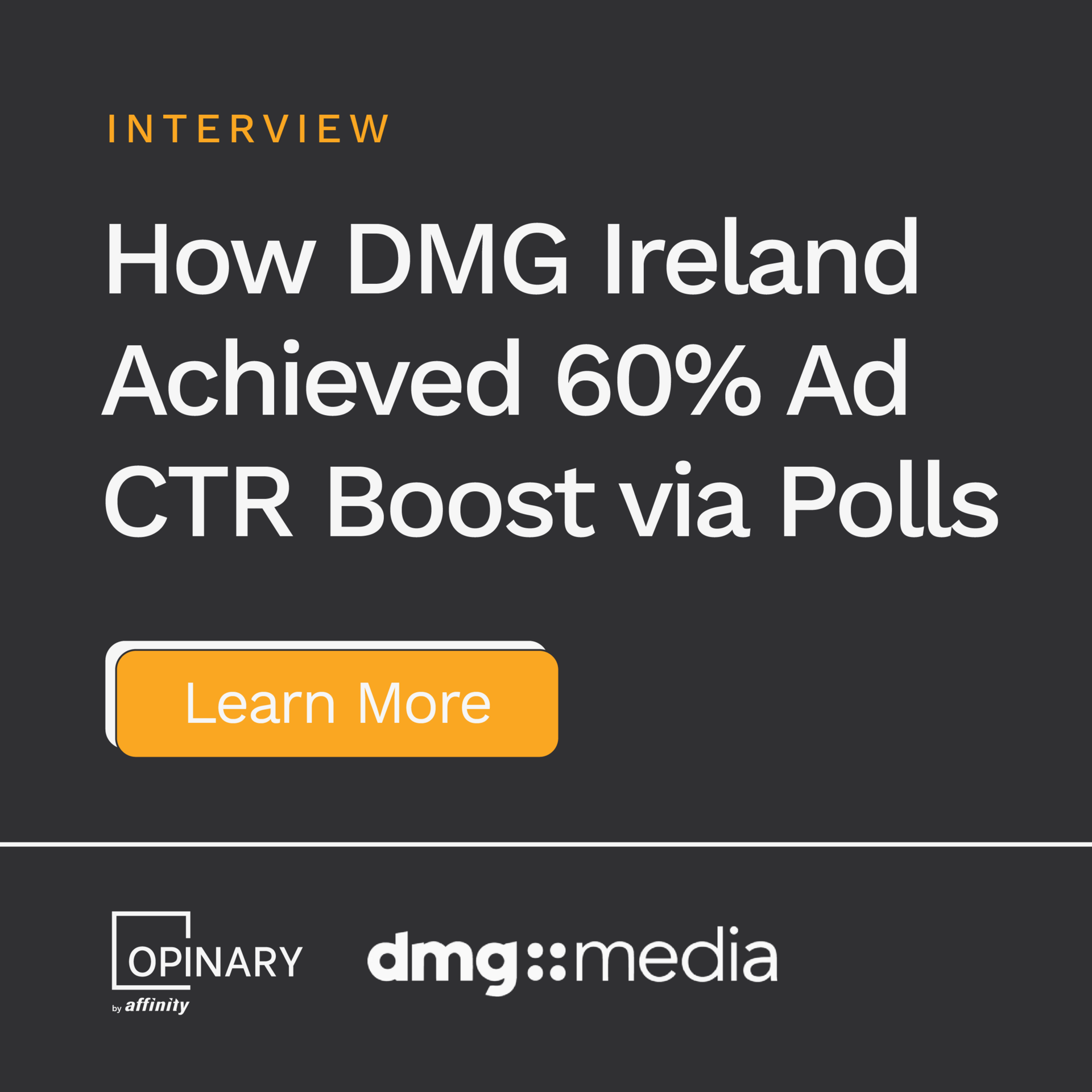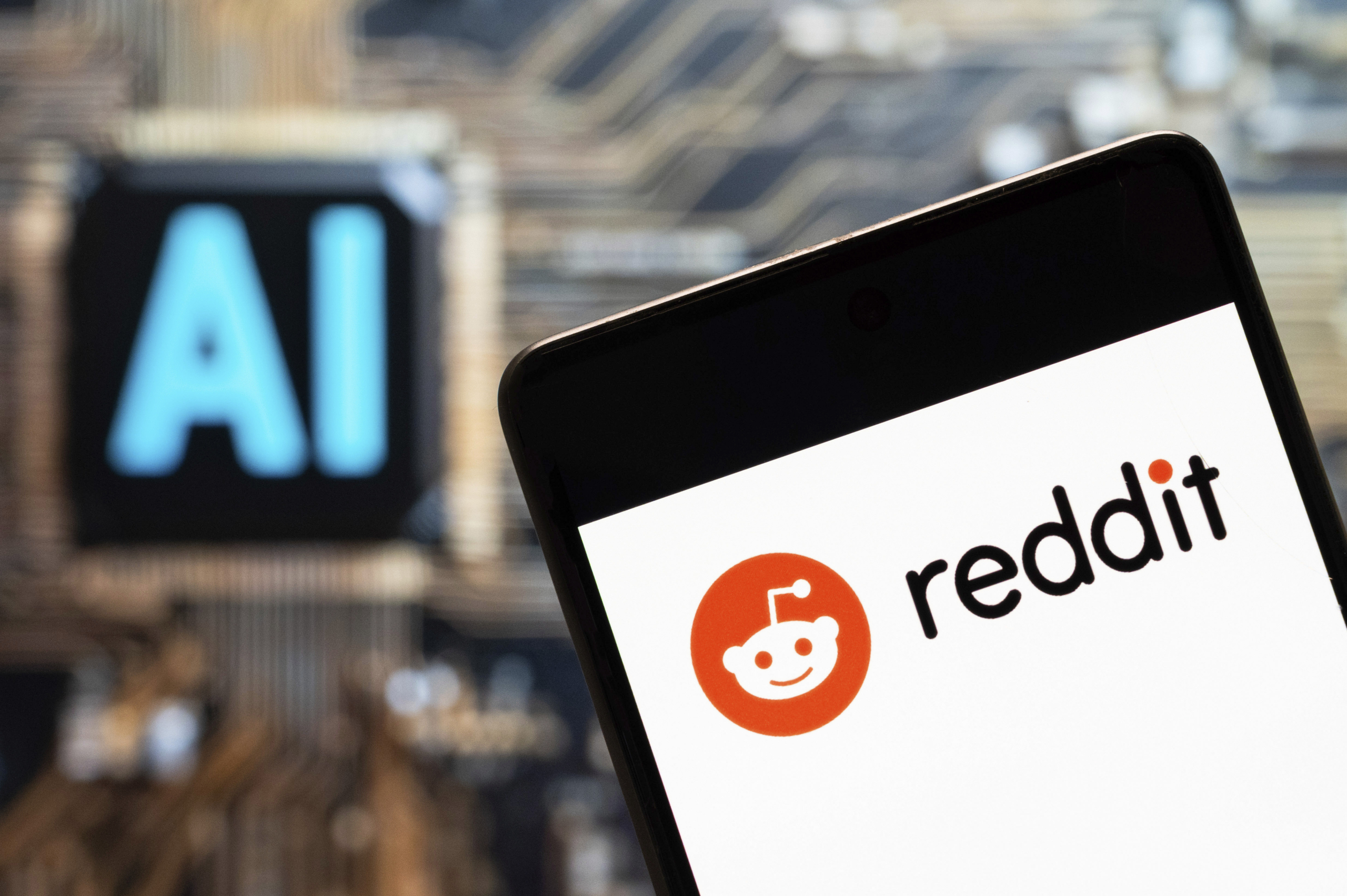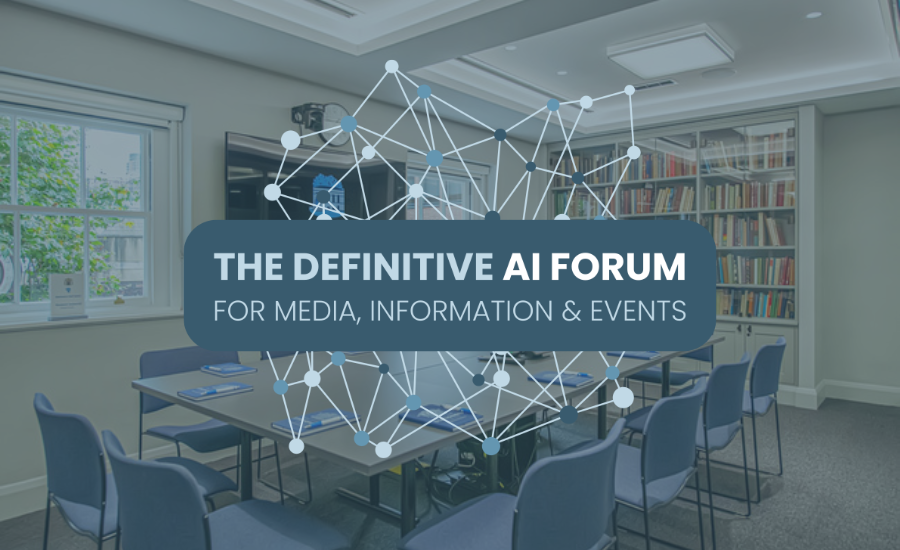- The Publisher Newsletter
- Posts
- Immediate Media’s Sean Cornwell on investing in AI experimentation, innovation and upskilling
Immediate Media’s Sean Cornwell on investing in AI experimentation, innovation and upskilling
“I’m a big believer that with all this change, you cannot succeed by being top-down,” says Immediate Media CEO Sean Cornwell, talking about bringing AI into the business. “You’ve got to try and encourage and empower the bottom-up.”
Welcome to The Publisher Newsletter, by Media Voices: your weekly newsletter profiling the people and products powering publishing.
- ad -
Daily Mail Group Ireland’s first-party data hack
Publishers like the Financial Times, Yahoo and NBC Universal all use Opinary to activate readers and drive conversions.
Daily Mail Group Ireland used Opinary’s in-article polls to capture user-declared data and channel it into their DMP, Permutive, while maximising audience engagement.
This boosted CTRs by 60%, brand engagement by 80%, CPMs by 40%, and strengthened advertiser relationships.
In this interview, DMG’s Group Head of Digital Strategy, Doug Farrell, shares how this approach reshaped their first-party data strategy.
Immediate Media’s Sean Cornwell on investing in AI experimentation, innovation and upskilling
“I’m a big believer that with all this change, you cannot succeed by being top-down,” says Immediate Media CEO Sean Cornwell, talking about bringing AI into the business. “You’ve got to try and encourage and empower the bottom-up.”
Special interest consumer publisher Immediate Media is a ray of hope amidst all the AI gloom. Over the last few years, the business, led by CEO Sean Cornwell, has looked really hard for ways to make AI work to its advantage.
Cornwell joined The Publisher Podcast this week to talk about how he’s preparing the business to stand out in a world of infinite content, and why he believes in sharing his optimism about the trajectory for AI in publishing.
Cornwell is also a speaker at Flashes & Flames and MediaVoices’ upcoming AI Forum for Media, Information & Events. He’ll be talking to Colin Morrison about what AI means to Immediate Media on November 25th. Full agenda, Masterclasses and tickets are available here.
Most importantly for Cornwell, when it comes to Immediate’s approach to AI his core belief is that it presents a lot of opportunities alongside the disruption. “Whatever the change or technological disruption, my philosophy is one where actually, we’ve got to lean into this,” he explained. “There’s no point putting your head in the sand and hoping that it goes away.”
Defending against infinite AI content
For media organisations, the primary disruption of AI is the sheer volume of content it can produce. In this world of infinite content, it’s a hard task to stand out. But this is the starting point for Cornwell. “What is defensible?” he asked. “What cannot be replicated, not just now, but in 18 months, or 36 months, or five years’ time?”
Brand is the first strongly defensible point Cornwell pointed to. But he noted that this applies to market-leading titles, and that brands in the mid- to long-tail are harder to defend. “There is something about the trust that comes with a category-leading brand, and the scale that has, which I think offers some protection,” he said.
The second defence against AI content is talent, or what Cornwell describes as “faces and voices.” He noted that younger audiences in particular have a tendency to follow individuals and talent rather than brands.
“That’s quite hard for AI to replicate because by its nature it’s generic,” he said, explaining that AI can be presented with an element of ‘personality’ but nothing close to unique human talent.
Other defences Cornwell cited on the podcast are communities, unique IP, and experiential in various shapes and forms, including live, virtual and AR. These are all areas Immediate are investing in as many of their brands are category-leading, such as Gardeners’ World, Radio Times and Good Food.
But underpinning all of this is the urgent need to double down on first-party relationships. “You’ve got to have a direct relationship with as many of your users, customers, and audience as possible,” Cornwell emphasised. This has been a core focus at Immediate for some years, and is part of the reason the business went deep into subscriptions back in 2020.
Their work is not done, however. Cornwell highlighted that Immediate are currently “focusing now big time on talent, and building our own external talent as well as partnering with external talent.” They are also looking to integrate their already successful live events businesses better with the parent brands and content.
Business optimism from the top
Cornwell believes that the key driver for Immediate’s success with AI so far is a positive attitude. He personally believes in its potential, and the whole company’s overall approach and philosophy is positive. However, he also identified some practical aspects which have helped bring everyone along.
The first point is in being careful what language senior leadership are using around AI publicly. “I hear a lot of people who are spending energy going, ‘It’s outrageous what Google is doing, and what Amazon and Meta and OpenAI are doing,’” he illustrated. “Yes, maybe. But you can’t control it, so move on.”
This doesn’t mean that Immediate isn’t cognisant of the risks of AI. As an example, Cornwell pointed to the scenario where publishers could see more than half their Google search traffic drop in the next two years. “It’s not ideal, but it’s not catastrophic,” he explained. “Our energy is very much focused on the positive and the opportunity.”
Secondly, Cornwell is a big believer in investment in upskilling staff. Immediate have invested a “huge amount” over the last three years in learning programmes for staff, from summer workshops and programmes to regular hackathon-style experimentation days.
The aim with all these is to encourage people to try new projects and test new ideas. Although AI features heavily, it’s not the exclusive focus. FutureFest, a day held in March for Immediate staff, had creativity and innovation as core themes. Tech expert Benedict Evans and comedian Lenny Henry were among the speakers talking about content engagement, creative disruption, and future trends.
“We had people from Venture Capital, we had comedians, we had people who are experts at building brands, and we brought all these people together to foster ideas and talk about where we’re heading, and the future, and what opportunities might look like and what the world might look like,” said Cornwell, explaining that this was to create an environment where people can embrace the future confidently.
Immediate is also prepared to put its money where its mouth is. The business has an Innovation Fund to give staff not just the permission, but the resources to innovate. It has green-lit more than 50 projects since launching three years ago.
“Essentially, it’s a very quick way to give small amounts of money – £2,000, £5,000, £10,000 – to internal ideas and internal projects,” said Cornwell. “There are tonnes of good ideas in your business. You’ve just got to unlock them, and give people the opportunity to go and run with them.”
One tip Cornwell shared for other publishers was to measure the use of AI internally; not to put staff under pressure, but to assess progress. He said that 53% of Immediate staff use AI tools on a weekly basis, and more than 80% use it on a monthly basis.
“Actually, over 60% of our people are excited or open-minded about AI and the opportunities,” Cornwell outlined, also pointing out that only 5% are ‘anxious’. He believes this is reflective of the work the business has done to embrace and figure out AI opportunities together.
Bottom-up
All these initiatives and strategies have a single aim in mind: to empower all staff to experiment and innovate with new tools and technologies. “I’m a big believer that with all this change, you cannot succeed by being top-down in terms of the answers,” emphasised Cornwell. “You’ve got to try and encourage and empower the bottom-up.”
His advice to other publishers is to focus on what can be controlled, be clear on strategy, and know where you’re heading. Staff at all levels must understand the ‘why’ of decisions, and crucially, leaders need to execute against those strategies as well as they possibly can.
Listen to the full conversation with Sean Cornwell in this week’s episode of The Publisher Podcast, available wherever you find podcasts.
Sean will be speaking at The Definitive AI Forum for Media, Information & Events on November 25th in London – see here for more information and tickets.








